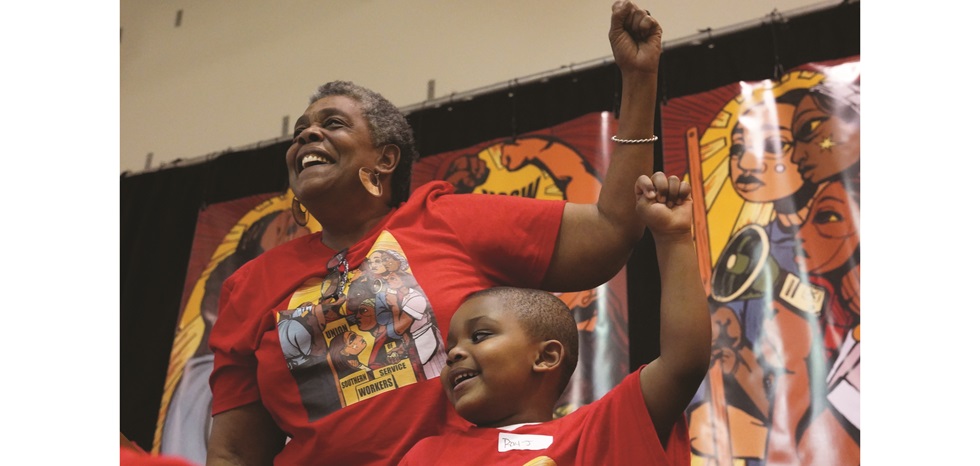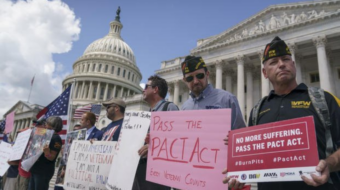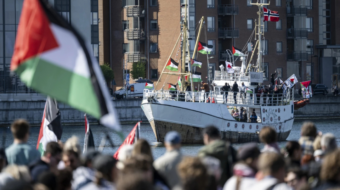
GREENSBORO, N.C.—Members of the Union of Southern Service Workers (USSW) seemed to have caught the perfect weekend as they lined up to stroll into the quaint basketball gym belonging to the New Light Missionary Baptist Church in Greensboro.
It was late January, and a week before, a frigid cold spell had ripped through the southeast, but this week, an abnormally cool 60-degree winter day gave way to lighthearted conversations between restaurant and fast food workers.
Members from three USSW chapters—Atlanta, Durham, and Columbia—walked past the plastic foldout tables and picked up t-shirts and packets. It was time to settle in for the 2nd Annual USSW Worker Power Summit, and the energy was high.
“Grab a red, blue, or green folder, these will be your groups for later,” a USSW employee instructed the workers. “And don’t grab the same color as your friend! We gotta talk to each other, y’all.”

The gym was similar to those of many Southern churches, tucked away on a bottom floor flanked by hallways leading to conference rooms and worship spaces small and large. Round tables surrounded by folding chairs would be the hosts for the day’s discussions and lessons. Any big day requires full stomachs, though, and the workers lined up for breakfast to attain the needed energy for the work ahead.
“Children first, children first!” the elders shouted out to the line. With plates stuffed with grits, eggs, and every Southern breakfast delicacy imaginable, summit attendees headed back to their tables. After eating and smoking one last cigarette, it was show time, and what other way to start a union summit than some chanting?
A 10-person strong drumline kicked off the chants as they marched in from a side entrance, greeted by a thunderous round of cheers and applause. The sticks continued to rattle against the snares, folks started rising to their feet, and just when the energy couldn’t grow anymore, a USSW member with a megaphone belted out:
“WHO ARE WE?”
“USSW!” the crowd chanted back, not hesitating for a moment.
“AND WHAT DO WE DO?” the chant leader called.
“ORGANIZE THE SOUTH!”
Several other chants followed, many modeled after chants that echoed throughout countless cities during the 2020 George Floyd protests.
“What do we want?”
“Twenty-Five!”
“And when do we want it?”
“Now!”
The call-and-response of “twenty-five” refers to the $25 hourly wage demands that USSW members have made in several cities, most notably for Waffle House workers. In November 2023, USSW delivered 13,000 signatures with these demands, but Waffle House refused to respond. USSW is now seeking even more signature to ramp up more pressure on the Southern classic breakfast joint.
After wrapping up breakfast and opening remarks by worker leaders, MCs and chant leaders let the crowd know they wanted to hear from the workers themselves about why they came to Greensboro that weekend and, more importantly, why they wanted a union in their workplaces.
A few union members holding mics made their way through the crowd, giving the floor to any worker who raised their hands. Workers from Wendy’s, Burger King, and Waffle House, among other restaurants, told their comrades about the importance of organizing their store. Some were shy, with words slowly leaving their mouths, while others spoke triumphantly with bold fists waving in the air. Nonetheless, each speaker received applause and cheer.
The day that followed was packed with various lessons and workshops designed to equip workers with the necessary tools and knowledge to organize on the job.
Trading lessons and experiences

There were four rotating lessons for the day: “Know Your Rights,” “How to Amplify the Fight,” “How We Fight,” and “Soul and Our Movement.” With one hour dedicated to each program, union members rotated to participate in group games and activities, get lessons from veterans of the union movement, and engage in some good old-fashioned community building.
First, in the “Know Your Rights” session, union members went through various real-life scenarios in which workers rights were violated in the workplace. In a group game, workers had to determine which rights were being violated and find out the best course of action to handle individual rights violations.
After an hour of collective brainstorming, group leaders peered down at their watches and let the group know it was time to move onto the next session: “How to Amplify the Fight.” In this workshop, summit attendees gathered in a small room with a projector and two worker leaders, each of whom worked in the service industry but had undergone spokesperson training for the union.
During this discussion, workers explained the importance of crafting press statements and interview responses. In doing so, they explained, workers should portray the union in a positive and professional light, while also remaining relatable and in touch with the average worker. Just as the previous session had wrapped up, group leaders and union members shuffled out of the room to wind down the church hallways to their next workshop.
“Come on, I know y’all tired but you gonna need this information for y’all’s workplaces for when you go home” the session leaders for the next discussion proclaimed to the USSW members as they made their way to the tables for the following workshop.
During this session, discussion leaders made sure to go around the room and have everyone introduce themselves once more and let the other know where they worked. Again, food businesses like Waffle House, Wendy’s, and Burger King were among the most popular. Workers from the same company in different states would often fist bump, or give each other an “I know what you go through” look, as a small act of solidarity in a space intended for it.
In the “How We Fight” meeting, worker leaders gave USSW members a toolkit and strategy guide in order to organize their workplace and win immediate demands. Rather than organizing workplaces through National Labor Relations Board-certified union elections, USSW uses the strategy of direct action, such as petition letters and strikes, to win immediate demands on the job site.
In order to make these tactics successful, leaders in the discussion informed workers about the importance of talking to their co-workers about organizing and other methods like identifying workplace leaders, also known as “work mamas and papas.”
Session leaders told the workers it was necessary to turn anger and frustration on the job into a legitimate force for change. According to them, this could only be done with accountability to goals and actions set forth by the employees themselves in any given restaurant or store.
Solidarity, militancy, anti-racism
As laid out in a pamphlet all workers received upon arrival at the summit, the USSW is committed to a set of core values for organizing: solidarity, militancy, and anti-racism. By emphasizing consistent and collective pressure on bosses that amplifies Black and brown workers’ struggles, the union has seen several victories in Southern states since its founding.
When it comes to inclusivity, USSW members do more than just talk; they have made concrete strides to include those in the labor struggle who might feel left out, specifically queer workers.
Earl Bradley, a home healthcare worker from the Durham chapter, started a LGBTQ support group after he noticed there “were too many LGBTQ workers that are scared to speak to their bosses” because they felt singled out at work due to their sexuality or gender expression.
While Earl emphasized the struggle against bosses, he also acknowledged the internal struggle within USSW to “teach people in the union how to respect the LGBTQ [workers]”, whether it be respecting names and pronouns, or simply educating themselves on the daily struggles of queer workers.
Earl pointed out that while queer workers face abuse on the job, straight and cis workers do as well. Rather than quarrel with each other, Earl stressed the need to focus organizing efforts against bosses and corporations to win better treatment for all.
After wrapping up the session, the USSW members headed back into the gym for their last workshop of the day: “Soul and Our Movement.” When workers arrived at the summit, one of the first activities of the day was chanting in order to raise the spirits and energy in the room. This last workshop made the point to drive home for workers why it is important to instill a sense of passion and determination into their work, and ways that they can do that.
In this workshop, summit attendees came up with their own chants to the tune of various songs, such as Lil Durk and J. Cole’s “All My Life.” Using Southern rappers’ songs as a way to drum up energy is not an unexplored strategy in the union. At any given USSW rally, it is very likely that one will hear members chanting the hook to Atlanta rapper Archie Eversole’s 2002 hit “We Ready.”
Becoming worker leaders
Invigorated and exhausted at the same time, USSW members strolled back into the gym after their last workshop to end the night in fellowship over dinner. Friends who had been split into different groups hugged each other, asking how their sessions went and which one was their favorite. Teenagers attending the summit with their parents showed each other the doodles they had drawn during the day.
After the workshops, workers like Alice Choup, an Atlanta chapter member who works two jobs at Choice Coffee Company and JCPenney, reported that he felt “empowered to take a stance” against what he feels is unfair in workplace, and with the knowledge from sessions like “How We Fight,” he felt he had “the tools to communicate” with his co-workers, as well as union members.
Alice said that he attended the summit to learn “how to become a worker leader” at his own jobs and help those who don’t realize that organizing is an option. Alice’s smirk and high spirits upon returning to the gym tables communicated that they felt more than ready to complete this task upon returning to work.
The fast food and retail workers lined up for one last meal together that night, making sure to thank the catering workers as they piled grilled chicken and green beans onto their plate. Many of those receiving the food worked in restaurants and hospitality as well.
Once bellies were full and cigarettes were smoked, the buses filled up and departed for the hotel. Some headed out to bars together, others stuck around to play late-night UNO. At 8 AM the next morning, the workers piled on the bus for good and headed back to New Light for the last day of the summit.
Change the South, Change the Nation
Day two started similar to the first day, breakfast and more chanting. Members of the drum line made their way through the tables, encouraging people to rise to their feet as they chanted. The day progressed as MC Keith Bullard laid out the plan for the USSW in 2024.
Overall, he stressed that the union should not be seen as the workers’ “best kept secret” but rather as something to “share with everybody.” He reminded the workers how important the Southern aspect of the USSW is. He called back to the racist legacy of slavery and Jim Crow that stained the South for years, and how it was the fights and struggles in the Deep South that would go on to set the tone for the rest of the United States.

Bullard’s words echoed the statement printed in bold on the first page of the summit handbook: “CHANGE THE SOUTH, CHANGE THE NATION.”
Additionally, Bullard announced that the USSW would be hosting a workers’ school in Durham in 2024 to give workers the skills and tools they need in order to organize their own workplaces.
Before wrapping up, organizers from the summit announced they would be giving out awards to worker leaders in the union who exemplified what the USSW stands for and who took the fight to organize workers to the next level.
One of those winners was Tee Gonzalez, a Dunkin’ worker from Atlanta who helped to lead his store on a four-day strike when he and his coworkers became fed up with the conditions that they had to endure on the job. Tee was hoping for an award that day but was not expecting one, so when his name was called for the USSW Courage Award, he shrugged his shoulders trying to contain his smile as he made his way to the stage. On the way, he made sure to give out and receive plenty of fist bumps and high fives from his fellow Atlanta Chapter members.
Tee told his fellow union members, “The union helped me win something, and now I’ve gotta help others win.” Tee had a message as well for those who may not have joined the union or are feeling hesitant about doing so. “You guys gotta come out to our events,” he emphasized. Tee had his own hard journey to fight for respect on the job, but he knew he was not the only one. “If you have a story, get that story out there.”
By 2 p.m., it was finally that time to head home. New friends hugged each other and said goodbye. Equipped with Sharpies and phones, USSW members marched around the gym asking those they met for their numbers or asking them to sign the summit posters they were going home with.
While the workers were saying goodbye to each, a sense of togetherness and belonging hung in the air that could not be shaken. The tears wiped from faces and the warm embraces served as testimony to this fact. It was time to make the voyage back to work and to put the skills to use.
It was time to organize the South.
We hope you appreciated this article. At People’s World, we believe news and information should be free and accessible to all, but we need your help. Our journalism is free of corporate influence and paywalls because we are totally reader-supported. Only you, our readers and supporters, make this possible. If you enjoy reading People’s World and the stories we bring you, please support our work by donating or becoming a monthly sustainer today. Thank you!










